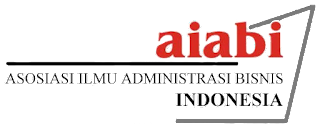MENGEKSPLORASI AKAR PERMASALAHAN DARI KETIDAK EFEKTIFAN IMPLEMENTASI PELATIHAN STUDI KASUS DI PT PELABUHAN INDONESIA I (PERSERO)
Abstract
ABSTRACT
In line with the vision of Pelindo 1 to become a leading provider of port and logistics services at the regional level, increasingly demanding the competitiveness of human resource in Pelindo 1. By conducting a good management training process, employees are expected to experience both attitude, knowledge and skills. In 2016, Pelindo 1 has conducted 88 training programs managed by BPL and PO-SDM. However, from recapitulation data show that many participants feel the training that has been held is not effective, relevant and useful for daily work. Based on the issue, the researcher conducted a qualitative research to explore the root casue of ineffective training implementation. The researcher chose rapid ethnographic method because it is considered as the most effective method for identifying the deep factors which can not be identified through quantitative methods.
From the root cause analysis result using 5 Why method, the researcher can conclude that the cause of ineffective training implementation is caused by two institutions, namely BPL and PO-SDM, which act as designer, decision maker, and training organizer. Based on the research that has been done, polemic dualism of management affects the design and implementation process of training in Pelindo 1. Based on the findings of the researcher, The Director of Human Resource and General Affair as the leader of the two institutions take the researcher’s solutions to resolve the dualism conflict by dividing it into two phase; first phase providing BPL with more training portion than PO-SDM and second phase returning BPL and PO-SDM function in accordance with their respectice task. By implementing two phases, it is hoped that soon to solve polemic dualism between BPL and PO-SD and become the answer for improving training quality in Pelindo 1 for the future.
Â
Â
Keywords:Training, Qualitative Research, Ethnography, 5 Why Method, Dualism
Full Text:
PDF (Bahasa Indonesia)DOI: https://doi.org/10.46576/jbc.v5i2.1090
Article Metrics
Abstract view : 658 timesPDF (Bahasa Indonesia) – 559 times
Refbacks
- There are currently no refbacks.
Copyright (c) 2021 Bisnis Corporate
JURNAL BISNIS CORPORATE TERINDEKS PADA :
MEMBER OF :

JURNAL BISNIS CORPORATE BERKOLABORASI DENGAN :
JURNAL BISNIS CORPORATE published by :
PROGRAM STUDI ADMINISTRASI BISNIS
FAKULTAS ILMU SOSIAL DAN ILMU POLITIK
UNIVERSITAS DHARMAWANGSA
Alamat : Jl. K. L. Yos Sudarso No. 224 Medan
Kontak : Tel. 061 6635682 - 6613783 Fax. 061 6615190
Surat Elektronik : bisniscorporate@dharmawangsa.ac.id
JURNAL BISNIS CORPORATE by Universitas Dharmawangsa is licensed under a Creative Commons Attribution-NonCommercial-ShareAlike 4.0 International License.
Based on a work at http://jurnal.dharmawangsa.ac.id/index.php/jubisco/index




1.gif)






